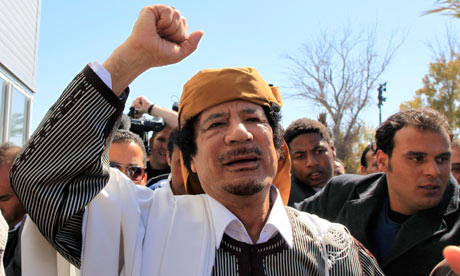Act on oil now to stop future Gaddafis
The Libya contact group must push for transparency to prevent leaders treating oil resources like a personal piggy bank

Muammar Gaddafi has prevented oil revenues flowing to the people of Libya. Photograph: Ahmed Jadallah/Reuters
The 40-nation Libya contact group is meeting the Interim National Transitional Council to decide how best to support the rebels against Muammar Gaddafi's forces. Top of a fairly extraordinary agenda will be how to unfreeze Libya's assets so that its oil revenues can flow to the insurgents. But negotiators must also look beyond their immediate objective, and recognise that they are presiding over an unprecedented opportunity to ensure that these flows benefit the people of Libya. If they are serious about laying the foundations for long-term peace and stability, transparency in the oil sector is the right place to start. One of the clearest lessons from the Arab spring is that a lack of transparency over how a country manages its resources helps keep dictators in power, and creates the conditions for new ones to emerge. It's what allowed Gaddafi to exert his stranglehold over the Libyan oil sector and what enabled the collusion of foreign companies and banks in his doing so. The results of this collusion are being played out on the streets of Misrata and Benghazi, as Gaddafi recruits mercenaries to brutalise Libya's people using money that is rightfully theirs. Global Witness has spent more than 18 years investigating corruption in the oil industry, often in autocratic and unstable states like Libya. Our experience is that once bad practice is established in a state's natural resource sector it takes decades to undo – by which time citizens have been robbed of the benefits of their natural wealth. Gaddafi treated Libya's oil money like a personal piggy bank, so transparency is urgently needed to prevent this happening again. It is crucial that the National Transitional Council's positive statements about transparency and accountability are translated into practice. Mechanisms must be put in place that make it a mandatory requirement for information about the country's oil sector to be made public. This means full disclosure of information to the Libyan people about how much money is earned from each oil field, where this money is paid and how it is managed and spent. We must also remember that while Gaddafi is bad, he is not unique. He's simply one of the worst symptoms of a very old problem, the roots of which stretch well beyond Libya's borders and into the heart of our extractive industries, political institutions and banks. Essentially, because oil companies do not currently have to disclose what they pay to foreign governments for resource deals, and banks do not have to report on their financial dealings with sovereign funds, it's very hard for citizens to know how their leaders are using their countries' natural resource wealth.More...






 7/19/2011 04:25:00 AM
7/19/2011 04:25:00 AM
 live news
live news












0 commentaires:
Post a Comment